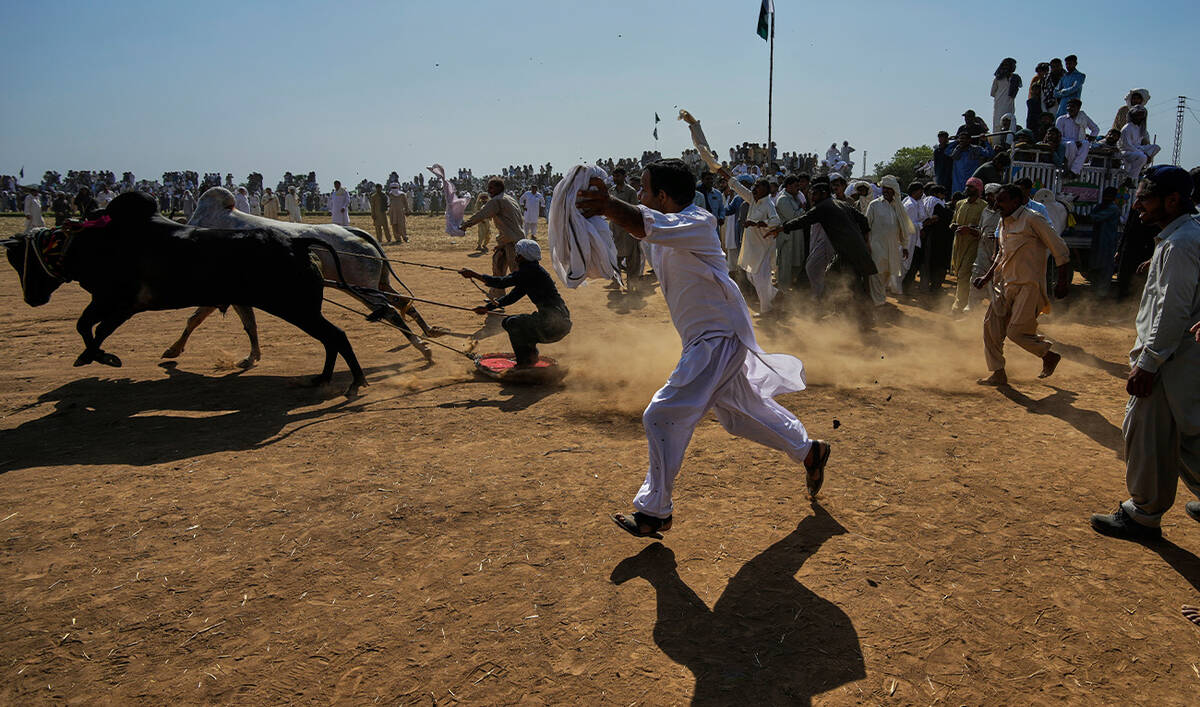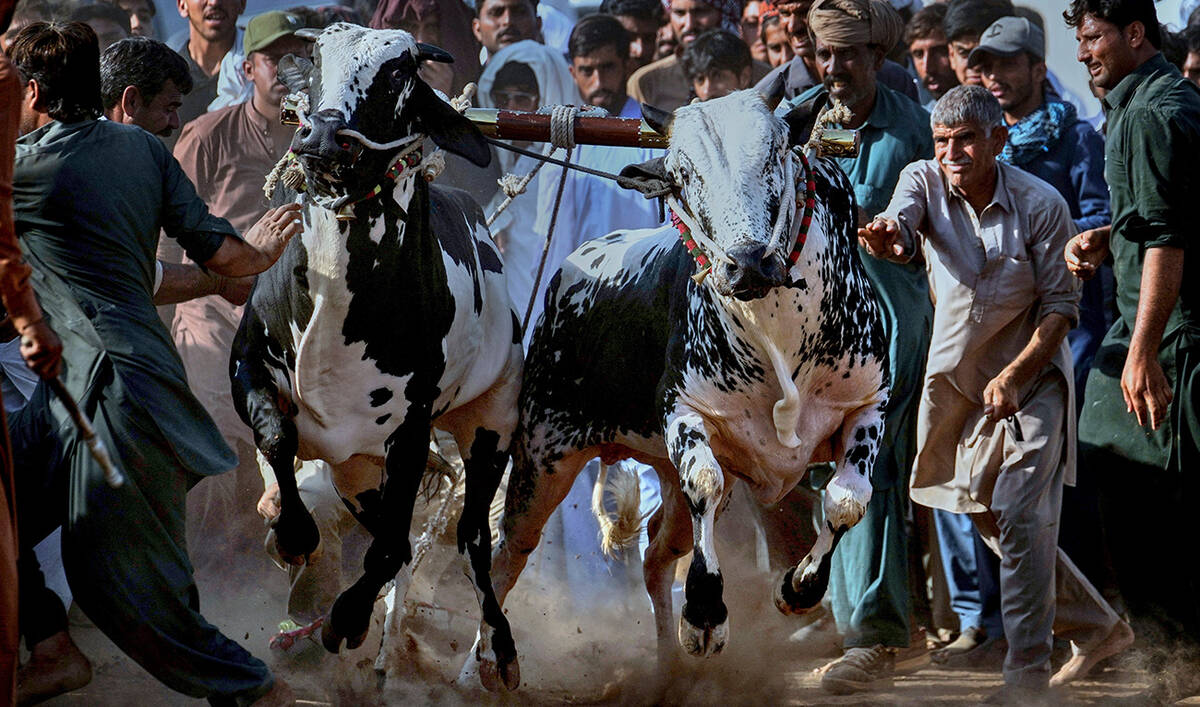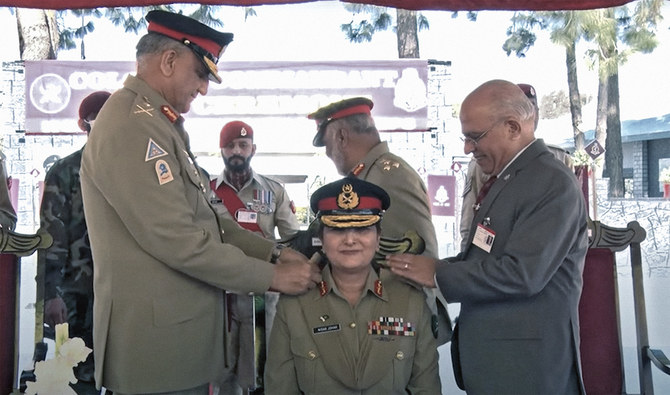ISLAMABAD: The first female lieutenant general of the Pakistan Army was formally appointed as Colonel Commandant of the Army Medical Corps (AMC) on Friday, announced the military's media wing, as the country's army chief called the development a moment of pride for the nation.
The appointment was made by Chief of Army Staff General Qamar Javed Bajwa during his visit to the AMC Center in Abbottabad where he first laid floral wreath at a martyrs' memorial.
General Bajwa pinned the badges of the rank on Lieutenant General Nigar Johar's uniform, making her the first female general in the army to receive the distinction.
The army chief lauded the AMC's contributions in ensuring high standards of healthcare during the days of war and peace.
He said the appointment "of the first ever three-star female General Officer of Pakistan Army as Colonel Commandant of AMC is indeed a matter of immense pride for Pakistan Army and the country," informed the official statement.
General Bajwa maintained the AMC had always answered the call of duty during natural calamities, adding its doctors and paramedics had acted as frontline warriors against COVID-19 and displayed exemplary commitment and resolve for the safety and well-being of the people of Pakistan.
"Keeping pace with rapid advancements in medical science is imperative for the doctors and paramedics to keep themselves at par with modern militaries and best global practices in health care," he continued.
Lieutenant General Johar hails from Swabi, a conservative region in the Khyber Pakhtunkhwa province.
She joined the Army Medical College in 1981 and graduated in 1985.
Pakistan's army chief appoints first female official as colonel commandant of medical corps
https://arab.news/23gfv
Pakistan's army chief appoints first female official as colonel commandant of medical corps

- Lieutenant General Nigar Johar hails from a conservative region in the Khyber Pakhtunkhwa province
- She is also the first and only woman who was promoted to the rank of lieutenant general in the army
In Pakistan, people don’t run with bulls, they race them in spectacular style

- Bull racing, Punjabi style, captures the raw energy of village life and is a world away from floodlit Pakistani cricket and hockey stadiums
- Bull racing has deep roots in Attock district of Punjab province where is more than just a sport but part of region’s living heritage
MALAL, Pakistan: Bulls are yoked together by thick wooden frames in a sun-scorched field of rural Pakistan, while behind them, holding onto nothing more than ropes and his honor, is a man on a plank.
Hundreds of spectators whoop and cheer as the animals begin to hurtle down a track, whipping up a storm of dust and imminent danger.
This is bull racing, Punjabi style.
The traditional sport captures the raw energy of village life and is a world away from the floodlit cricket and hockey stadiums found in many Pakistani cities.

Bull racing has deep roots in the Attock district of eastern Punjab province. It is more than just a sport there, it is a part of the region’s living heritage.
In the village of Malal, one of bull racing’s most vibrant hubs, hundreds of people gather every year to witness the spectacle. Jockeys crouch behind the animals on a plank, gripping onto some reins and relying on experience and instinct to triumph.
But there’s always a chance for chaos as it’s common for the bulls to throw the jockey off his platform and drag him through the dirt.
“This isn’t just entertainment, it’s tradition,” said Sardar Haseeb, whose family has been holding races for generations. “We take pride in our animals. Farmers and landowners raise their bulls year round just for this moment. People are willing to pay high prices for a winning bull. It becomes a symbol of pride.”

The bull race creates a festive atmosphere, complete with dancing and banknotes thrown into the air — a celebratory practice normally seen at weddings.
The scent of freshly fried sweets rises from hot pans to lure the crowds. Stallholders prepare roasted chickpeas and other delicacies. The hustle and bustle becomes a source of income for enterprising locals, who benefit from the cultural event.
More than 100 bulls competed in the event that Haseeb hosted, with people traveling from across Pakistan to be part of the race.
Among the competitors was farmer Muhammad Ramzan.
“My bull came in fifth place and I’m thrilled,” he said. “It left 95 others behind.”
‘Heartbroken’ Malala calls on world leaders to end Israel’s ‘genocide’ in Gaza

- Nobel Peace Prize winner draws attenion to starving children, demolished schools and hospitals, blocked humanitarian aid in Gaza
- The war, now in its 20th month, has killed over 53,000, left Gaza in ruins and its population facing a worsening hunger crisis
KARACHI: Nobel Peace Prize winner Malala Yousafzai on Wednesday said she was “heartbroken” by starving children, demolished schools and hospitals, blocked humanitarian aid and displaced families in Gaza, calling on world leaders to push Israel to end its ‘genocide’ in the besieged enclave.
Israel’s ground and air offensive, launched in October 2023, has displaced nearly all of Gaza’s 2.3 million residents and killed more than 53,000, according to Gaza health authorities. Israeli strikes have killed more than 500 people in the past nine days alone as its military campaign has intensified, Gaza medics say.
The war, now in its 20th month, has left Gaza in ruins and its population facing a worsening hunger crisis. It has strained Israel’s relations with much of the world and those with its closest ally, the United States, now appear to be wavering.
“It makes me sick to my stomach to see Israel’s cruelty and brutality in Gaza. I am heartbroken seeing thousands of starving children, demolished schools and hospitals, blocked humanitarian aid and displaced families,” Malala wrote on X.
“Our collective humanity calls for global and immediate action. I call on every world leader to put maximum pressure on the Israeli government to end this genocide and protect civilians.”

Malala’s statement came as Britain announced it was suspending trade talks with Israel and summoning its ambassador over “egregious policies” in the occupied West Bank and Gaza.
British Prime Minister Keir Starmer told parliament he, along with the leaders of France and Canada, was “horrified” by Israel’s military escalation, repeating calls for a ceasefire.
The three nations had warned on Monday of “concrete actions” against Israel if it did not stop military operations in Gaza and lift restrictions on aid.
In addition to suspending trade talks, Britain announced sanctions against a number of individuals and groups in the Israeli-occupied West Bank over alleged violence against Palestinian residents.
European Union foreign policy chief Kaja Kallas has also asked for a review of the EU-Israel trade deal, according to Dutch news agency ANP.
EU sanctions on violent Israeli settlers have been prepared but have so far been blocked by one member state, Kallas said, without naming the country.
“External pressure will not divert Israel from its path in defending its existence and security against enemies who seek its destruction,” Israeli Foreign Ministry spokesperson Oren Marmorstein posted on X.
The United Nations said no humanitarian aid had been distributed yet in Gaza, although Israel eased its 11-week-old blockade on Monday.
“Israeli authorities are requiring us to offload supplies on the Palestinian side of Kerem Shalom crossing and reload them separately once they secure our team’s access from inside Gaza,” said UN spokesperson Stephane Dujarric.
He said four trucks of baby food were dropped off on the Palestinian side of the border on Monday, and that a few dozen trucks of flour, medicine, nutrition supplies and other basic items entered Gaza on Tuesday.
Israel’s military said 93 UN aid trucks entered Gaza on Tuesday via Kerem Shalom “after a thorough security inspection.”
– With inputs from Reuters
Pakistan reports two new polio cases, bringing 2025 tally to 10

- Pakistan, Afghanistan last two countries in the world where polio remains endemic
- Pakistan reported 74 cases of polio in 2024, raising alarm bells over a fresh breakout
KARACHI: Pakistan’s polio eradication program said on Wednesday two new cases of the wild poliovirus had been detected in the country’s northwestern Khyber Pakhtunkhwa province, bringing the tall of 2025 cases to 10.
The new cases have emerged ahead of the government launching a third nationwide campaign to vaccinate children under the age of five, scheduled from May. 26 to June 1. The campaign will target over 45.4 million children across 159 districts, including high-risk areas of southern Khyber Pakhtunkhwa, where the new cases have been detected.
Polio is a paralyzing disease that has no cure. Multiple doses of the oral polio vaccine and completion of the routine vaccination schedule for all children under the age of 5 is essential to provide children high immunity against the disease.
“The Regional Reference Laboratory for Polio Eradication at the National Institute of Health has confirmed two new cases of wild poliovirus in District Lakki Marwat and District Bannu, South Khyber Pakhtunkhwa,” the body said in a statement.
“With these latest detections, the total number of confirmed polio cases in Pakistan in 2025 has risen to 10, five from Khyber Pakhtunkhwa, four from Sindh, and one from Punjab.”
The statement said while polio vaccination campaigns continued nationwide, with two already held in 2025, certain areas, particularly in southern Khyber Pakhtunkhwa, faced challenges such as restricted access and difficulties in conducting house-to-house vaccination drives.
“These access and operational hurdles leave thousands of children particularly in South KP at risk of exposure to poliovirus as a result of missed opportunities for vaccination,” the statement said.
Due to ongoing access constraints and community concerns, children in UC Bakhmal Ahmad Zai (Lakki Marwat) missed out on vaccination opportunities during the February and April 2025 immunization campaigns, resulting in immunity gaps.
In UC Saintanga, Tehsil Wazir (Bannu), no comprehensive campaign had been implemented since October 2023. Limited access, shortage of female vaccinators, and gaps in monitoring had contributed to immunity gaps, leaving children at continued risk of poliovirus transmission.
“The Pakistan Polio Eradication Program is actively engaging with all stakeholders to address operational and access challenges and to enhance the effectiveness of vaccination campaigns in these high-risk areas. An intensified vaccination schedule is being implemented to interrupt virus transmission and protect children from lifelong paralysis,” the polio program added.
In the early 1990s, Pakistan reported around 20,000 polio cases annually but in 2018 the number dropped to eight cases. Six cases were reported in 2023 and only one in 2021.
Pakistan and Afghanistan are the last two countries in the world where polio remains endemic.
Pakistan’s polio program began in 1994 but efforts to eradicate the virus have since been undermined by vaccine misinformation and opposition from some religious hard-liners who say immunization is a foreign ploy to sterilize Muslim children or a cover for Western spies.
Militant groups also frequently attack and kill members of polio vaccine teams and security guards protecting them.
Islamabad, Beijing discuss bolstering ‘collective response mechanisms’ after India-Pakistan fighting
Islamabad, Beijing discuss bolstering ‘collective response mechanisms’ after India-Pakistan fighting

- Islamabad’s worst military standoff with New Delhi in decades gave Chinese weapons a rare battle test
- Pakistan used China’s J10-C Vigorous Dragon and JF-17 Thunder planes, armed with air-to-air missiles
KARACHI: Beijing’s ambassador to Islamabad met the Pakistani air chief on Tuesday evening, with the two leaders vowing to “bolster collective response mechanisms to emerging threats,” the Pakistan army said in a statement, a little over a week after Islamabad’s worst military standoff with New Delhi in decades gave Chinese weapons a rare battle test.
The most striking claim from four days of fighting earlier this month was the contention of the Pakistan Air Force (PAF) that its Chinese-supplied jets had shot down six Indian aircraft — including three French-made Rafale fighters — with some observers seeing this as a symbol of Beijing’s rising military might.
Pakistan accounts for around 63 percent of China’s arms exports, according to Stockholm International Peace Research Institute (SIPRI).
In the recent fighting with India, Pakistan used the J10-C Vigorous Dragon and JF-17 Thunder planes, armed with air-to-air missiles. It was the first time the J10-C has been used in active combat. Islamabad’s air defenses also used Chinese kit — including the HQ-9P long-range surface-to-air missile system — and deployed Chinese radar as well as armed and reconnaissance drones.
On Tuesday evening, Chinese Ambassador to Pakistan, Jiang Zaidong, called on Air Chief Marshal Zaheer Ahmed Baber Sidhu, Chief of the Air Staff, Pakistan Air Force, and engaged in a “comprehensive and in-depth discussion on a range of matters including corporate-level engagements, defense cooperation and the evolving geostrategic environment in the region.”
“They underscored the importance of cohesive & collaborative approaches in responding to emerging challenges, emphasizing the necessity of maintaining peak operational readiness and swift coordination amidst the prevailing regional security dynamics,” the Pakistan army said in a statement released after the meeting.
Sidhu commended China’s role in assisting Pakistan’s defense modernization and technological advancement.
“Both the dignitaries reaffirmed their pledge to institutionalize regular high-level exchanges through expanded joint operational exercises and exploration of multilateral frameworks that bolster collective response mechanisms to emerging threats,” the Pakistan army said.
The statement said the Chinese ambassador lauded the “unmatched operational excellence” demonstrated by PAF personnel during the recent standoff with India, terming it a reflection of PAF’s “high standards and unwavering commitment to national defense.”
“He praised Pakistan Air Force for its exemplary professionalism and commendable utilization of Chinese-origin equipment & technology to thwart enemy aggression,” the Pakistan army said.
“The dignitary also acknowledged PAF’s operational effectiveness and strategic acumen in employing indigenous solutions and advanced systems to safeguard national interests and deter potential threats under the current leadership.”
The ambassador assured “full technical assistance” to PAF to bolster its aerial defense capabilities, adding that continued focus on homegrown technological development would further elevate the country’s defense capabilities.
Nuclear-armed neighbors Pakistan and India halted their worst fighting in nearly three decades after agreeing to a ceasefire on May 10, following diplomacy and pressure from the United States.
On Tuesday, China’s Foreign Minister Wang Yi sad Beijing welcomed and supported efforts by Pakistan and India to handle their differences through dialogue and to achieve a “comprehensive and lasting” ceasefire.
With inputs from AFP and Reuters
Pakistan says open to talks with India after IMF flags tensions as loan risk

- Indian Defense Minister Rajnath Singh has called on IMF to reconsider $1 billion loan to Pakistan
- Finance advisor says structural benchmarks mentioned in the lender’s latest report not new terms
KARACHI: Pakistan on Tuesday hinted that it was open to “constructive diplomatic and economic engagement” with India as the International Monetary Fund (IMF) said prevailing tensions between the two archfoes had increased enterprise risks to Islamabad’s ongoing loan program.
The development comes days after Indian Defense Minister Rajnath Singh said the IMF should reconsider a $1 billion loan to Pakistan alleging it was “funding terror,” a move denounced by Islamabad as proof of New Delhi’s desperation.
India and Pakistan this month clashed in the worst military violence in decades, killing around 70 people before agreeing a ceasefire on May 10. The conflict was sparked by an attack on tourists in Indian-administered Kashmir that New Delhi blamed on Islamabad, a charge it denies.
Khurram Schehzad, adviser to Pakistan’s finance minister, said the Washington-based lender had not imposed any new “conditions” on Pakistan, which continues to pursue stability and responsible governance that supports long-term growth for itself and the region alike.
“Constructive diplomatic and economic engagement in the region, including with neighbors, remains essential,” Schehzad told Arab News, when asked about the recent developments on the fiscal front.
The IMF last week approved a loan program review for Pakistan, unlocking a $1 billion payment which the State Bank of Pakistan said had been received. A fresh $1.4 billion loan was also approved under the IMF’s climate resilience fund.
But the lender last week said the rising India-Pakistan tensions, if sustained or deteriorated further, could heighten enterprise risks to the fiscal, external and reform goals of its $7 billion ongoing loan program for cash-strapped Pakistan.
The IMF loan is vital for Pakistan which is trying to revive its debt-ridden economy that is expected to expand 2.68 percent by June, about one percent lower than the government’s earlier projection.
“Yes, the IMF report identifies regional tensions as a potential risk, as is customary in such assessments,” Schehzad said, adding that at the same time, the Fund had noted that Pakistan’s stocks market had reacted to the conflict modestly and retained most of its recent gains.
“We view this as a reflection of investor confidence in Pakistan’s macroeconomic path.”
Pakistan’s stocks, which rose more than 80 percent last year, have largely resisted selling pressures in recent weeks, despite the country’s conflict with India that saw the two sides strike each other with missiles, drones and artillery.
Schehzad rejected the impression that Pakistan had increased its defense budget and said it remained constant at 1.9 percent of the gross domestic product this fiscal year starting in June 2024.
“The Rs2.414 trillion defense budget cited in the IMF’s staff report is an absolute projection,” he said.
After debt servicing, defense spending is the second biggest drain on Pakistan’s revenues that the country is trying to improve by withdrawing energy subsidies and taxing incomes from agriculture, retail and real estate sectors as one of the conditions set by the IMF under its 37-month Extended Fund Facility (EFF) secured in September.
BUDGET DISCUSSIONS
An IMF team is currently discussing with Pakistan the upcoming federal budget that the country is expected to unveil early next month, said IMF officials privy to the discussions, requesting anonymity as they were not authorized to speak to media.
The talks are expected to conclude “this week” after which the IMF would issue a concluding statement, they told Arab News, without explaining what exactly the two sides were discussing.
The IMF’s latest country report, issued last week, mentioned certain structural benchmarks for Pakistan’s economic reform program that Schehzad said represented the natural progression of the measures already agreed upon, when Pakistan signed the Memorandum for Economic and Financial Policies (MEFP) in September.
“There are not newly introduced conditions. Each step builds logically on the foundations laid in earlier phases of the program,” he said, adding that each structural benchmark the IMF’s report mentioned was part of a sequenced approach to reforms that was designed in phases and built upon progress achieved in the country’s earlier reviews.
Pakistan on May 9 secured the IMF board’s nod for its first review that saw the release of about $1 billion to the cash-strapped country and the approval of the country’s request for a 28-month, $1.4 billion Resilience and Sustainability Facility (RSF) to cope with environmental vulnerabilities.
“These benchmarks are not surprises. They are deliberate follow-ons to earlier milestones,” Schehzad said, citing Pakistan’s parliamentary approval of the next budget in line with the IMF staff agreement as a second step toward the country’s goal of achieving a primary surplus of 2 percent of GDP by FY27.
“The first step was the FY25 budget [presented in June last year], which targeted a 1.0 percent surplus.”
Terming several other IMF structural benchmarks as a continuation of what has been agreed upon with the lender, Schehzad said some new benchmarks were introduced in response to recent developments.
“The plan to publish a post-2027 financial sector strategy and the move to remove the cap on the debt service surcharge are based on new realities, including the recent constitutional amendment and the government’s evolving energy sector reform strategy,” he said.
Other reforms, according to the adviser, included phasing out incentives in Pakistan’s special technology zones and industrial parks by 2035 to ensure a level-playing field, and lifting a ban on the import of used cars to reduce trade barriers was consistent with the trade liberalization goals outlined in the September 2024 MEFP.
The finance adviser confirmed that the remaining 13 actions fall under the separate climate resilience-focused facility, RSF, that were approved by the IMF’s executive board.
“These measures reflect Pakistan’s steady and sovereign commitment to economic reform and transparency, not externally imposed demands,” he said.










